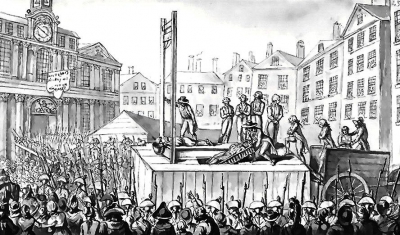The French Revolution (French: Rvolution franaise [evlysj fsz]) was a period of radical political and societal change in France that began with the Estates General of 1789 and ended with the formation of the French Consulate in November 1799. Many of its ideas are considered fundamental principles of liberal democracy, while phrases like libert, galit, fraternit reappeared in other revolts, such as the 1917 Russian Revolution, and inspired campaigns for the abolition of slavery and universal suffrage. The values and institutions it created dominate French politics to this day.Its causes are generally agreed to be a combination of social, political and economic factors, which the existing regime proved unable to manage. In May 1789, widespread social distress led to the convocation of the Estates General, which was converted into a National Assembly in June. Continuing unrest culminated in the Storming of the Bastille on 14 July, which led to a series of radical measures by the Assembly, including the abolition of feudalism, the imposition of state control over the Catholic Church in France, and extension of the right to vote.
The next three years were dominated by the struggle for political control, exacerbated by economic depression and Civil disorder. Opposition from external powers like Austria, Britain, and Prussia resulted in the outbreak of the French Revolutionary Wars in April 1792. Disillusionment with Louis XVI led to the establishment of the French First Republic on 22 September 1792, followed by his execution in January 1793. In June, an uprising in Paris replaced the Girondins who dominated the National Assembly with the Committee of Public Safety, headed by Maximilien Robespierre.
This sparked the Reign of Terror, an attempt to eradicate alleged "counter-revolutionaries"; by the time it ended in July 1794, over 16,600 had been executed in Paris and the provinces. As well as its external enemies, the Republic faced internal opposition from both Royalists and Jacobins and in order to deal with these threats, the French Directory took power in November 1795. Despite a series of military victories, many won by Napoleon Bonaparte, political divisions and economic stagnation resulted in the Directory being replaced by the Consulate in November 1799. This is generally seen as marking the end of the Revolutionary period.
The Reign of Terror, commonly called The Terror (French: la Terreur), was a period of the French Revolution when, following the creation of the First Republic, a series of massacres and numerous public executions took place in response to revolutionary fervour, anticlerical sentiment, and accusations of treason by the Committee of Public Safety.
There is disagreement among historians over when exactly "the Terror" began. Some consider it to have begun only in 1793, giving the date as either 5 September, June or March, when the Revolutionary Tribunal came into existence. Others, however, cite the earlier time of the September Massacres in 1792, or even July 1789, when the first killing of the revolution occurred.The term "Terror" being used to describe the period was introduced by the Thermidorian Reaction who took power after the fall of Maximilien Robespierre in July 1794, to discredit Robespierre and justify their actions. Today there is consensus amongst historians that the exceptional revolutionary measures continued after the death of Robespierre, and this subsequent period is now called the "White Terror". By then, 16,594 official death sentences had been dispensed throughout France since June 1793, of which 2,639 were in Paris alone; and an additional 10,000 died in prison, without trial, or under both of these circumstances.

1794May, 8
Branded a traitor during the Reign of Terror by revolutionists, French chemist Antoine Lavoisier, who was also a tax collector with the Ferme générale, is tried, convicted and guillotined in one day in Paris.
Choose Another Date
Events on 1794
- 27Mar
Original six frigates of the United States Navy
The United States Government establishes a permanent navy and authorizes the building of six frigates. - 8May
French Revolution
Branded a traitor during the Reign of Terror by revolutionists, French chemist Antoine Lavoisier, who was also a tax collector with the Ferme générale, is tried, convicted and guillotined in one day in Paris. - 26Jun
Battle of Fleurus (1794)
French Revolutionary Wars: Battle of Fleurus marked the first successful military use of aircraft. - 28Jul
Maximilien Robespierre
French Revolution: Maximilien Robespierre and Louis Antoine de Saint-Just are executed by guillotine in Paris, France. - 7Aug
Whiskey Rebellion
U.S. President George Washington invokes the Militia Acts of 1792 to suppress the Whiskey Rebellion in western Pennsylvania.

 English
English  español
español  français
français  português
português  русский
русский  العربية
العربية  简体中文
简体中文 